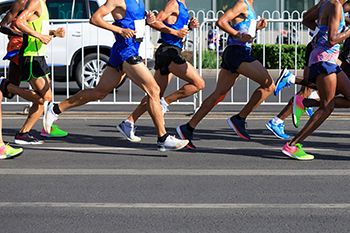
Gait retraining is an increasingly popular intervention for distance runners experiencing pain or injury due to improper running mechanics. This specialized training focuses on altering a runner’s movement patterns to reduce stress on tissues and redistribute forces more evenly across joints. Common techniques include visual feedback, step rate manipulation, and foot strike adjustments. Each method of gait retraining aims to correct specific biomechanical issues that contribute to running-related injuries. While gait retraining has proved effective, it is essential to tailor the approach to the individual’s needs and abilities. A podiatrist can help a runner make an informed decision about which gait retraining methods will be most beneficial. Given the complexity of running mechanics, a thorough evaluation by a podiatrist ensures that the method chosen will address the root cause of pain without introducing new issues. If you experience foot pain after long distance running, it is suggested that you schedule an appointment with a podiatrist to determine if gait retraining is needed.
If you have any concerns about your feet, contact Michele Kraft, DPM from Toes on the Go. Our doctor can provide the care you need to keep you pain-free and on your feet.
Biomechanics in Podiatry
Podiatric biomechanics is a particular sector of specialty podiatry with licensed practitioners who are trained to diagnose and treat conditions affecting the foot, ankle and lower leg. Biomechanics deals with the forces that act against the body, causing an interference with the biological structures. It focuses on the movement of the ankle, the foot and the forces that interact with them.
A History of Biomechanics
- Biomechanics dates back to the BC era in Egypt where evidence of professional foot care has been recorded.
- In 1974, biomechanics gained a higher profile from the studies of Merton Root, who claimed that by changing or controlling the forces between the ankle and the foot, corrections or conditions could be implemented to gain strength and coordination in the area.
Modern technological improvements are based on past theories and therapeutic processes that provide a better understanding of podiatric concepts for biomechanics. Computers can provide accurate information about the forces and patterns of the feet and lower legs.
Understanding biomechanics of the feet can help improve and eliminate pain, stopping further stress to the foot.
If you have any questions please feel free to contact our office located in Carmel, CA . We offer the newest diagnostic and treatment technologies for all your foot and ankle needs.
